- Home
- David Pilling
The Hooded Men Page 7
The Hooded Men Read online
Page 7
Hugh’s mouth worked, as if sheer fright had robbed him of speech. He took a step closer to the big outlaw, nervously twisting his hands together.
“Please, master,” he whined. “Please...I meant no offence...please...”
When he was within arm’s length of Walter, he raised his right hand slightly and tapped the tips of his thumb and index finger together, three times. This was a pre-arranged signal meant for Richard, part of the sign language only they knew.
As he soon as he saw it, Richard tore out his sword. “Now!” he roared at the top of his voice. His men, armed with spears and shields, clapped in their spurs and galloped straight at the nearest outlaws.
Walter’s bowmen were alert. Six arrows whipped through the air. Three flew wide, two thudded against the shields, one stuck into a horseman’s thigh. He cried out and plunged grimly on, spear levelled. The wickedly sharp iron tip drove into an outlaw’s chest and lifted the man off his feet, writhing like a worm caught on a hook.
At the same time the wagons exploded with men. Hugh’s soldiers flung aside the sacks and barrels they had been hiding under and leaped out, roaring war-cries. A few had crossbows, and hung back to loose off bolts at the astonished men in green. The air was suddenly full of screams and curses, blades clashing, horses whinnying in fright, missiles flying back and forth.
All this happened in moments. Walter half-turned to shout at his men. Hugh kicked him in the balls, hard, and had the satisfaction of watching his old tormentor crumple to earth. The outlaw’s mouth worked soundlessly, hands clasped over his private agony. He stared up at Hugh with utter confusion in his eyes.
“You should have accepted my offer, master,” said Hugh with a wink. Then he dropped back into a defensive crouch as two of Walter’s men hurled themselves at him.
He had hidden his dagger behind him, tucked into his belt. Now he whipped it out and ducked to avoid a spear-thrust at his head. His attackers, surprised at how quickly he moved, hesitated.
“Come on, lads,” Hugh whined in the ridiculous squeak he had adopted. “I’m only one fat old man. A couple of big strong bullocks like you should be able to mow me down without breaking sweat. Or are you craven as well as shit-ugly?”
The spearman gave an angry shout and rushed at him, while the other held back. Hugh dodged and sidestepped, just as his old swordmaster had taught him. Frustrated, the other man slipped on some loose stones. Hugh kicked his feet from under him, tore away his spear and retreated a few steps.
He sheathed his dagger and weighed the spear in both hands. The spear wasn’t his favourite weapon, but at least it gave him some reach.
“Just getting warmed up,” he panted with a grin at the outlaws. The one he had knocked over scrambled to his feet, his face flaming scarlet with rage and embarrassment. His comrade, an older man with a touch of grey in his matted locks, stayed rooted to the spot.
Hugh kept a wary eye on this one. An old soldier, by the looks of him. He was of medium height, carried a notched sword and dented buckler, and his leathery, nut-brown face was horribly disfigured by old scars.
Clever old bastard, thought Hugh. He will let the younger man wear me out, while he watches to see how I fight.
Around them the battle continued to rage. Walter’s outlaws quickly recovered from their surprise and fought back with savage fury. Their leader groaned and showed signs of getting up, so Hugh kicked him again, this time in the stomach. He folded up, choking and gasping like a landed fish.
An arrow flashed past Hugh’s face. The green-clad archers on the edge of the forest were calmly shooting at his men. Screams tore through the air as the shafts found their mark.
Richard was alive to the danger. Hoofs thundered to the right, and a troop of horsemen smashed into the flank of the archers, scattering them, driving them into the trees. They were led by Richard, shouting his war-cry as he struck right and left.
“A Giffard! A Giffard!”
He hacked down three men and rode down a fourth. The others broke and ran for the safety of the forest, hotly pursued.
The man Hugh had knocked over came at him again. This time the young outlaw wielded a sword, and bellowed like an angry bear with a stone in its paw as he slashed at Hugh’s head and shoulders.
He was a bad swordsman, and had lost his temper. Hugh defended himself for a while, enjoying the look of baffled exasperation on his opponent’s face.
Then he remembered the young footpad Richard had killed near Dover. He had been not much older than this one. Hugh experienced another irritating twinge of pity. Boys such as these were led astray by the likes of Walter Devyas, who lured them into a life of crime with promises of wealth and freedom. The reality was short, brutish and extremely nasty, with the gallows at the end of it.
Hugh might have easily killed his opponent. He contented himself with skinning the young man’s knuckles, forcing him to drop his sword. The outlaw howled in pain, and reached for the fallen weapon with his left hand.
He stopped. The tip of Hugh’s sword was pressed against his throat, not quite hard enough to draw blood.
Their eyes met. “Run away,” Hugh said softly. “Run away and do something useful with your life. Now.”
“Fuck you,” spat the other. He turned and sprinted away on his long legs, into the forest.
Hugh sighed and turned to the older man. “What about you?” he asked. “Are you going to stand there all day, or shall we dance?”
The grey-haired outlaw looked around him. Many of his comrades lay stretched out on the grass, bleeding their lives out, or were in full flight. Hugh’s men were more numerous, and had the outlaws on the run.
“Another time,” the outlaw said in a deep Yorkshire accent. He sheathed his sword and looked Hugh up and down.
“That’s a bloody awful disguise,” he added with a grin. “Gave me a good laugh, though. Your face cream is starting to run.”
He tipped Hugh an ironic salute, then loped away into the trees. One of Richard’s men tried to block his escape, but he ducked under the horse’s belly and scrambled away, leaving the rider red-faced and cursing.
Keep running, old wolf, thought Hugh. Despite himself, he had a strange affection for such old rogues, who spent their disgraceful lives holding death at arm’s length. Eventually he would come to a bad end, but not today.
Hugh glanced down at Walter Devyas. The big outlaw was still curled up on the ground, breath whistling between his teeth as he fought for breath.
“My apologies,” said Hugh. “I may have kicked you a bit harder than I intended.”
He tore off his wig and cap and tossed them away. Then he seized a handful of Walter’s greasy hair and yanked his head up. His bloodshot eyes widened as they drank in the face of his captor.
“Remember me?” Hugh asked quietly. Walter’s chest heaved as he worked up the strength to speak.
“No,” he rasped. “Should I?”
Hugh was slightly disappointed, but not surprised. The earl of Lincoln had once described him as the fortunate owner of a forgettable face, a prized quality in a spy. To look at, Hugh was average in all respects: plain features, average build, mousy brown hair, pale complexion, mild blue eyes. A blank canvas, upon which any image could be painted and wiped away.
“You may not know me,” said Hugh. “But I promise you this. Before we are done, you will learn to curse my name.”
Walter snorted in contempt. “I’ve been threatened before, play-actor. Do your worst.”
“I mean to,” came the reply.
* * *
The caravan made its way south, back to Nottingham. Five of Lady Clemence’s soldiers had died in the fight in Sherwood and eight more suffered injury. The dead and wounded were piled aboard the wagons, while a separate wagon was given over to the handful of captured outlaws. These sat in miserable silence, guarded on either side by Richard’s horsemen. Walter Devyas was slung over a spare horse like a bundle of laundry, a gag stuffed into his mouth, wrists and ankles bound painful
ly tight.
Hugh had cast off his disguise and rode proudly at the head of the column. He wore his battered old brigandine, a thick coat sewn with iron plates, which had protected his skin all the way to the Holy Land and back. The padded coat was heavy but comfortable, and he preferred it to the more costly maul hauberk.
His men marched in triumph through the streets of Nottingham, gawped at and cheered by the citizens. Hugh’s men had to hold back the crowd, desperate to get at his prisoners and tear them apart. The outlaws of Sherwood were hated in Nottingham. In the past few years they had terrorised the district, making the roads unsafe, robbing and killing innocent travellers. As the wagons moved slowly towards the castle, set high on its sandstone rock, the prisoners were showered in filth, spittle and curses.
Richard galloped up and down the column, beating enraged citizens back with the flat of his sword. “We can’t keep them off forever,” he shouted at Hugh. “Much more of this, and the mob will turn on us.”
Help arrived just in time. Trumpets sounded above the roar of the crowd, and a troop of mailed sergeants galloped down from the castle gates. They rode straight the townsfolk, who scattered before them.
The sergeants were led by the constable himself, who raised his mailed fist in salute. Hugh recognised the ruddy features under the old-fashioned nasal helm. “Alan Kirkby,” he said, returning the salute. “It’s been a while.”
Alan’s mouth turned down at the corners. “Hugh Longsword,” Hugh added patiently. Sometimes he wished his face wasn’t so instantly forgettable.
“Ah.” The constable’s frown vanished. “Longsword, yes. Lord, it has been a few years since we last dined together. I got your message, but the envoy didn’t say you were in charge of this travelling fair.”
Hugh had sent a rider on ahead to warn Alan of his coming, but thought it best not to divulge his name. Too many people in these parts had long memories. Hugh had visited Nottingham before, seven years gone, and left in a hurry.
He jerked a thumb at Walter Devyas, still trussed up over a packhorse behind him. “We had a scrap in the forest. Took a few prisoners. I want to question this one, and must lodge in the castle for a few days.”
Alan’s eyes widened as he looked at the captive. “Holy God!” the constable exclaimed. “You’ve scooped up Devyas! I’d recognise that yellow-faced bastard anywhere. How in hells did you do it? I’ve been chasing him for years.”
“It’s a long story,” replied Hugh. “I’ll be happy to tell you later, over a jug of wine and a decent meal. Right now I am weary. So are my men. Will you take us up to the castle? I would very much like a bath.”
It had been months since he indulged in a bath. Hugh bathed frequently, perhaps eight or nine times a year, and liked to make a proper job of it. There was nothing like sinking up to one’s chin in a tub full of the hottest water he could stand. To lie there and broil while the chamber filled with steam and all the aches and tears in his body melted away. To live without bodily pain, if only for an hour or so. Sheer bliss.
Alan seemed to hesitate. This irritated Hugh. Did he have to dig out his royal commission and wave it under the bloody man’s nose? It was always the same. Alan was friendly enough towards Hugh, but an unbridgeable gulf lay between them. He was a knight; Hugh was a peasant. Whatever he did in life, however he distinguished himself, he would always be inferior to those of gentle birth.
“Of course,” Alan said after an uncomfortably long pause. “You and your men are welcome to stay as long as you wish. You have done a great service.”
Hugh detected the note of envy in the other man’s voice, and cursed his own lack of tact. By parading Walter Devyas through the streets of Nottingham, like a trophy of war, he embarrassed the constable. Alan and his knightly comrades had been hunting the outlaws of Sherwood for years, without any success. Now Hugh – Hugh the serf, Hugh the spy, Hugh the jumped-up son of a mason, of all things – had shown them up.
That evening the constable entertained Hugh and Richard to dinner in the great hall. They were seated next to Alan at high table, above the salt, while the sergeants messed with the garrison at the lower tables. Since it was high summer, and the evenings scarcely less warm than daytime, no fire burned in the great hearth.
At first Hugh said little and ate much. His host had far more in common with Richard, since they were both of the same class, and he happily left them to chatter on about hunting and tournaments while he wolfed his food. As always after a fight, he was ravenous, and the stews, roast meats and puddings set before him were of the best.
The wine was also good, but Hugh was careful not to tip too much down his throat. He needed a clear head for later.
To his dismay, Alan showed a keen interest in his exploits in the Holy Land. “How was the king when you left him?” he asked. “The story of the assassin has been all over England for months. There are all kinds of rumours. Some say he will never be able to walk again. Think of that! England cannot have a cripple for a king.”
The anxiety in his voice seemed genuine. For a moment Hugh considered whether Alan Kirby was part of the alleged conspiracy brewing in the north. He dismissed the thought. There was no certainty, of course, but Alan had been a loyal servant of the crown for years. For now, Hugh decided it was safe to trust him.
“Ignore the rumours,” he said. “The lord king is not crippled, and with God’s help shall make a full recovery from his wounds. It is true he had to undergo a very painful operation. A surgeon cut away the poisoned flesh.”
Alan winced and made the sign of the cross. “When I left him at Acre,” Hugh went on, “he was still weak, but in good hands. He intends to set sail for home in August or September.”
The constable looked grim. “Then he will not set foot on English soil for almost a year. Edward has been away too long. He should never have gone on crusade. England needs her king. So long as the king is here, the land will thrive. Without him...”
Hugh looked at his host with mild interest. “Some might call that a pagan belief. The land and the king are one, and so forth.”
He snapped his fingers at a page boy bearing two flat knives loaded with roast beef. The page mounted the step to high table, so Hugh could spear a few thick slices of steaming red meat and pile it onto his trencher.
“I am as devout a Christian as any man,” Alan replied stiffly. “But the state of the kingdom should be obvious. England is wasting away. Only the king can restore the rule of law. Only he can quell the disturbances.”
“Nonsense,” said Richard. “The king is only one man, and that man is thousands of miles away. In his absence, loyal servants must do the work for him.”
He slapped the sword at his hip. “I’ve only been in England for a couple of weeks, and already put a few traitors in the ground. They aren’t much to worry about, barely worth getting my sword dirty. Take the scum we fought today. Mere peasants, poachers and runaway serfs and the like. Good with a bow, I daresay, or stabbing honest men in the back. None of them can stand up to true-born gentlemen in fair fight.”
Hugh smiled at the ironclad confidence in the lad’s voice. What it is to be young, strong and brainless, he thought. Richard would happily take on the entire world, sword in hand, and expect to win.
Alan’s ruddy features had paled with anger. Richard’s tactless dismissal of the outlaws of Sherwood was another slur on the constable’s honour.
“You got lucky today, boy,” he hissed. “And there are plenty of gentlemen among the rebels in England. Some of the best fighters you could find anywhere. Cross swords with Sir John d’Eyvill and his kin, and then come and boast to me of your prowess.”
Hugh shifted uncomfortably Mention of the d’Eyvills made the scar on his body throb. Once again he saw the sword flash down. Felt it carve into his flesh. He shuddered.
Richard was not used to such direct speech. He and the constable were staring daggers at each other. Unless Hugh steered the conversation into safer waters, these boneheads would end up
fighting a duel.
“We live in troubled times,” he said, “and loyal men should stick together. If not, the lord king may return to find his kingdom in ashes.”
He poured himself a cup of wine from the jug. “Gentlemen,” he said, raising the cup. “For the king.”
His companions glared at each other. Hugh looked at Alan expectantly. The constable was a much older and experienced man, and it was down to him to show a bit of common sense.
Does he seek to provoke a fight? Hugh wondered. Perhaps his loyalty was suspect after all. Jesu, who to trust! Perhaps Burnell’s suspicions did not go far enough, and the entire country north of Trent was infected with treason.
He breathed again when Alan slowly reached for his cup and held it high. Richard copied his action.
“For the king,” they chorused.
7.
It was a summer of blood and fire. Bands of armed riders ravaged the west, destroying all in their path. Granaries, storehouses, farms, towns – everything went up in flames. The king’s men responded in kind. Between them they turned the gentle hill country of Staffordshire and the March into a blackened, stinking desert. Half-ripened crops were burnt in the fields, good pastureland turned to waste, the roads plagued with robbers. Only a fool travelled at night; even in broad daylight people went armed and banded together for safety.
As ever in time of war, the common people suffered the worst. If the rebels didn’t take their cattle and sheep at swordpoint, royal officers came to buy the animals at a fraction of their value. This legal theft was called purveyance, one of the most hated laws in England.
“It is necessary,” the bailiffs would say to the sullen farmer as his beasts were driven away. “The king has to feed his men. If his soldiers cannot eat, how do you expect them to fight the thieves who burn your crops and set fire to the thatch over your heads?”

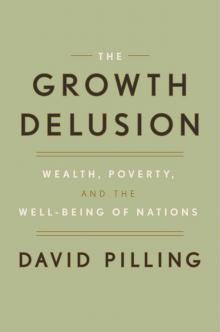 The Growth Delusion
The Growth Delusion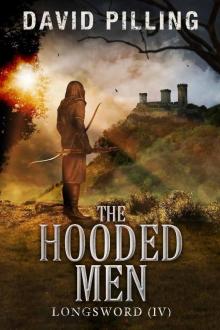 The Hooded Men
The Hooded Men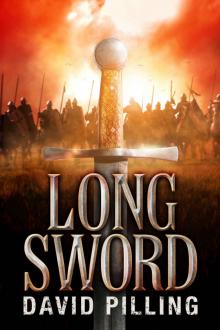 Longsword
Longsword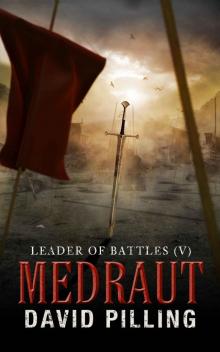 Medraut
Medraut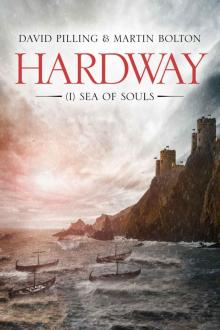 Hardway
Hardway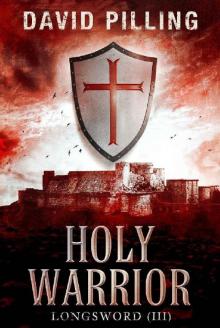 Holy Warrior
Holy Warrior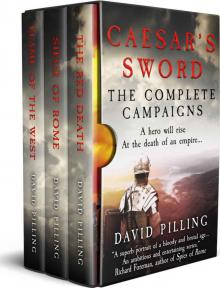 Caesar's Sword: The Complete Campaigns
Caesar's Sword: The Complete Campaigns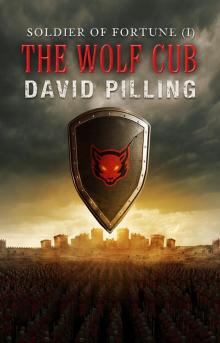 The Wolf Cub
The Wolf Cub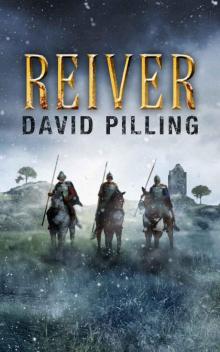 Reiver
Reiver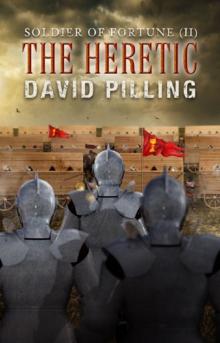 The Heretic
The Heretic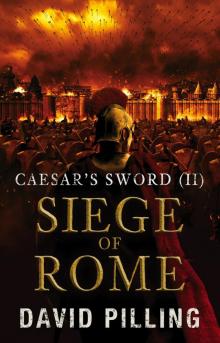 Siege of Rome
Siege of Rome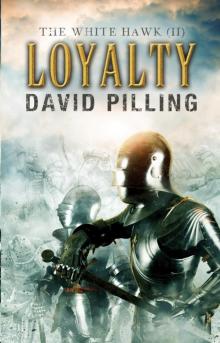 Loyalty
Loyalty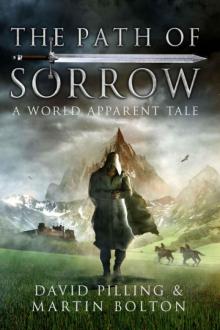 The Path of Sorrow
The Path of Sorrow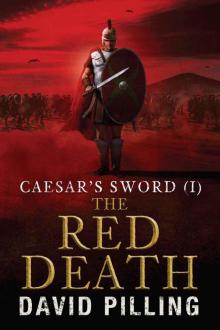 Caesar's Sword (I): The Red Death
Caesar's Sword (I): The Red Death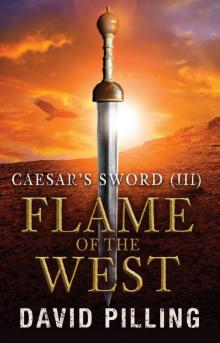 Flame of the West
Flame of the West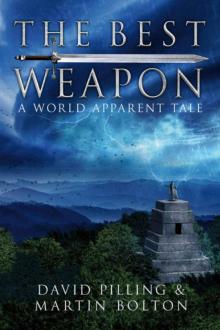 The Best Weapon
The Best Weapon Sacrifice
Sacrifice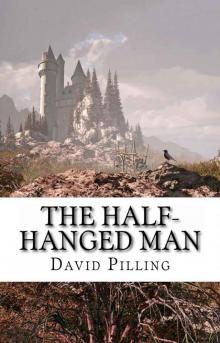 The Half-Hanged Man
The Half-Hanged Man